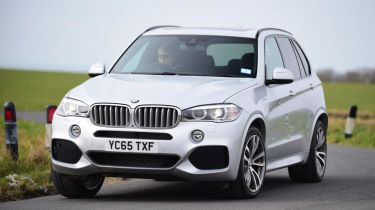Used BMW X5 (Mk3, 2013-2018) review - What’s it like to drive?
Some rivals are sharper to drive, but the BMW X5 Mk3 offers good comfort and most engines provide strong performance
Unlike its predecessors, the BMW X5 Mk3 doesn’t set the class standard for handling, though it is still decent to drive and offers a fairly comfortable and refined drive. Performance is strongest on the range-topping petrol and diesel models, though all of the engines have decent amounts of oomph to call upon, and they all get a slick automatic gearbox.
Engines and performance
Because both petrol-powered options on the BMW X5 Mk3 use a variation of a 4.4-litre twin-turbocharged V8, they have strong performance on tap. Even the least powerful version used in the 50i model produced a healthy 443bhp, and the X5M model was more potent still at 567bhp. The 50i was capable of cracking the 0-62mph sprint in 4.9 seconds, and the X5 M could complete it in a supercar-shaming 4.2 seconds. Both the V8s are smooth and refined, so they’re fine with general driving duties if you can afford the purchase price and running costs.
When it came to performance, the only diesel that could match the petrol options was the M50d model. This version used a 381bhp 3.0-litre triple-turbo six-cylinder engine, which was enough for a claimed 0-62mph time of 5.3 seconds. The less potent diesels were slower, but still pretty punchy for day-to-day driving duties: the 3.0-litre six-cylinder engines in the 30d and 40d produced 255bhp and 308bhp respectively, which means 0-62mph times of 6.8 seconds for the 30d and 5.9 seconds for the 40d.
Used - available now
At the bottom of the X5 Mk3 performance pecking order is the entry-level 25d diesel, which uses a 2.0-litre four-cylinder engine with 228bhp. Regardless of whether you go for the rear-wheel-drive or all-wheel-drive version, BMW claims both specs have an identical 0-62mph acceleration time of 7.7 seconds. While the 25d has a clear performance deficit, it’s in the same ballpark as the larger 3.0-litre engines when it comes to smoothness, though all of the diesels can sound a little bit clattery under hard acceleration.
On paper, the 40e petrol-electric plug-in hybrid model promises good performance: the 2.0-litre petrol engine and electric motor together produce a combined 305bhp, and BMW quotes a 0-62mph time of 6.8 seconds. However, it doesn’t feel particularly responsive and, while the electric motor means there’s good amounts of torque when pulling away from a standstill, the 40e starts to run out of puff at higher speeds.
On the road
Prior versions of the BMW X5 were among the sharpest large SUVs to drive, though that’s not necessarily the case with the Mk3 model. While it’s still decent to drive and has impressive amounts of grip when cornering, factors like the numb steering means you may want to look elsewhere if you’re after an engaging steer.
When it comes to comfort, the BMW X5 Mk3 fares better. The ride is on the firm side (especially when the firmest setting of the optional adaptive suspension system is engaged) and can be fidgety at motorway speeds, though the BMW does a good job for the most part at soaking up bumps in the road. Refinement levels are also really good, so the X5 Mk3 is a good choice for doing lots of long journeys in.
By big SUV standards, the BMW X5 Mk3 is fairly easy to drive around town. There’s good forward visibility, which in conjunction with the raised driving position means it’s easy enough to place the car accurately in tighter spots. Rearward visibility is compromised a little bit by the thick pillars, although that is mitigated a bit at lower speeds by the all-round parking sensors that came as standard on all models.
All versions of the BMW X5 Mk3 were available with all-wheel drive (optional on the entry-level 25d diesel; standard fit on every other variant), and the extra traction means they’re a little bit more capable than the rear-wheel-drive models when the roads are slippery. They’re also a bit better suited to light off-roading duties, although we’re more inclined to recommend something like a Range Rover Velar if you need a large family SUV with good off-road credentials. Regardless of the engine or drivetrain, every BMW X5 Mk3 came with a smooth-shifting eight-speed automatic gearbox.











